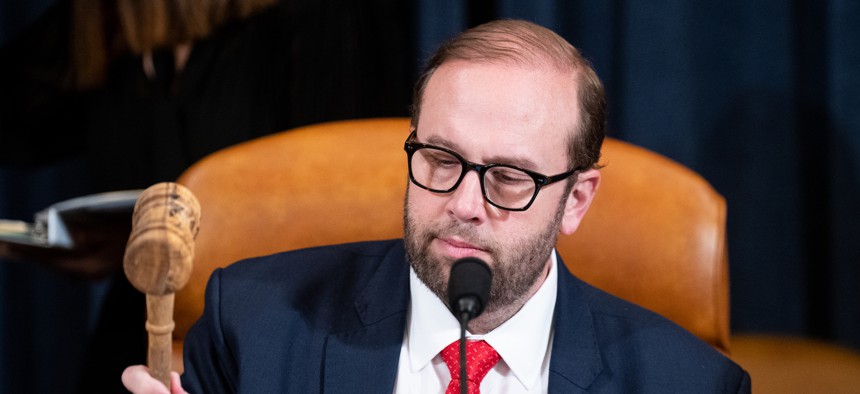Biden will veto Republican-led clawback of unemployment funding, White House says

House Ways and Means Committee Chairman Jason Smith (R-Mo.), shown here at a March 2023 hearing, is looking to claw back unemployment insurance funding. Bill Clark/CQ-Roll Call, Inc via Getty Images
The Office of Management and Budget says that the president would veto a Republican proposal to rescind American Rescue Plan Act funding for unemployment if passed by Congress.
President Joe Biden would veto a Republican proposal to clawback unobligated funds for unemployment modernization included in Democrats’ American Rescue Plan Act if it were to make it to his desk, the Office of Management and Budget said in a statement Monday.
The bill, called the Protecting Taxpayers and Victims of Unemployment Fraud Act, was introduced in February by House Ways and Means Committee Chairman, Jason Smith (R-Mo.), and House Committee on Oversight and Accountability Chairman, James Comer (R-Ky.).
The Ways and Means Committee reported the bill out of committee in April. The proposal’s 35 co-sponsors backers say that it would incentivize states to recover money lost to fraudsters in the jobless aid system.
The White House says that the proposal “would leave UI systems vulnerable to fraud and improper payments by eliminating vital resources” and highlighted work done to pilot identity verification systems in states, issue technical assistance to states and modernize unemployment insurance technology with the $2 billion in funding.
“Contrary to its stated purpose, this bill would strip state Unemployment Insurance (UI) programs of essential resources to fight fraud, combat identity theft, and recover overpayments,” the White House said.
Since 2020, states have struggled to combat a rise in fraud in the unemployment system after the government began to push out increased benefits to address the COVID-19 pandemic; earlier this year, the Government Accountability Office pegged the floor for fraud losses at $60 billion for the year and a half starting in April 2020, although that number is likely higher.
In 2021, Democrats put $2 billion into the system for improving access to benefits and fraud prevention as part of the American Rescue Plan Act.
By June, the department intends to have made $1.6 billion available to states, according to a department spokesperson, meaning that $400 million would be taken back if the Republican-backed proposal were to pass.
Smith called that $2 billion “wasteful and ineffective at combating fraud” during a February markup of his proposal, which he said “will recover stolen taxpayer money” and “will help states ensure this scale of fraud never happens again and help bring to justice those who committed these crimes.”
The Republican’s bill would also allow states to keep a cut of recovered payments to put towards program integrity efforts, extend pandemic staffing flexibilities and the amount of time states have to go after overpayments.
The OMB statement says that the bill would “unfairly punish workers whose overpayments were the fault of a state agency.”
The Labor Department and House Democrats have also cautioned that the bill’s financial incentives and recovery tools could incentivize states to target the recovery of overpayments not made due to intentional fraud, but instead because of mistakes made by states themselves or innocent errors from claimants not trying to commit fraud.
Smith said during the February markup that the bill is meant to focus only on fraud.
This proposal isn’t the only place where House Republicans are moving to take back the funding and policy priorities backed by Democrats.
House Republicans also included similar provision that would take back unobligated COVID-19 relief money, as well as parts of Democrats’ Inflation Reduction Act, in their package to increase the debt ceiling that they passed in April, although Democrats controlling the Senate and the White House have both vowed to block the measure.



